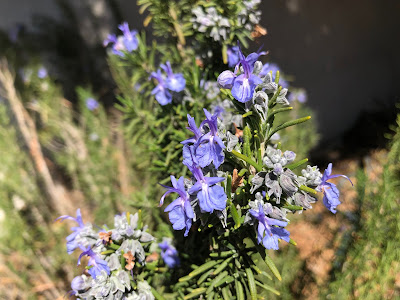
Grow some for you, some for the beneficial insects

|
|
Rosemary is flowering now. The herb is super for
cooking all kinds of dishes. The sturdy stems also
are great to use for barbecuing meat
or vegetable kebabs. (Photo: Kathy Morrison)
|
While planting that spring and summer garden, don't forget to tuck some herbs in and around the vegetables and annuals.
The best herbs to grow, I believe, are the ones I think of as "double-duty" plants. They can be used in cooking and teas, but they also serve as enticements for beneficial insects.
"Beneficials" include some pollinators, such as bees, but they also include good bugs that fight the nasty ones. These include lady beetles, hoverflies, damsel bugs, green lacewings and parasitic mini wasps. (There's a full UCCE master gardener Garden Note just on beneficial insects .)
My focus here is the herbs to plant now, before the weather warms up and the bad bugs go to town on your young plants. Other than basil, which grows easily from seeds, I've found that transplants work best when starting these herbs.
Two important notes:
-- You have to let some of the herbs flower. The insects want the pollen and nectar from the blooms, though flowering ("bolting") turns some herbs bitter and unusable in cooking. Decide which plants will be for the insects and which ones for your use -- say, two varieties of basil for the bees, one Genovese basil for your pizzas and pesto.
-- Though this is unlikely if you're planning to consume the herbs yourself, pesticide use is not recommended on the plants. All the insects, good and bad, could be killed. Use a blast of water on the plant if the aphids get too thick. Otherwise, let the lady beetle and her buddies handle the job.
Top double-duty herbs:
Comments
0 comments have been posted.Sacramento Digs Gardening to your inbox.
Sites We Like
Garden Checklist for week of July 21
Your garden needs you!
* Keep your vegetable garden watered, mulched and weeded. Water before 8 a.m. to reduce the chance of fungal infection and to conserve moisture.
* Feed vegetable plants bone meal, rock phosphate or other fertilizers high in phosphate to stimulate more blooms and fruiting. (But wait until daily high temperatures drop out of the 100s.)
* Don’t let tomatoes wilt or dry out completely. Give tomatoes a deep watering two to three times a week.
* Harvest vegetables promptly to encourage plants to produce more. Squash especially tends to grow rapidly in hot weather. Keep an eye on zucchini.
* Pinch back chrysanthemums for bushy plants and more flowers in September.
* Remove spent flowers from roses, daylilies and other bloomers as they finish flowering.
* Pinch off blooms from basil so the plant will grow more leaves.
* Cut back lavender after flowering to promote a second bloom.
* It's not too late to add a splash of color. Plant petunias, snapdragons, zinnias and marigolds.
* From seed, plant corn, pumpkins, radishes, winter squash and sunflowers.